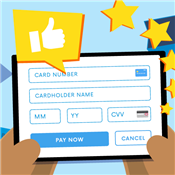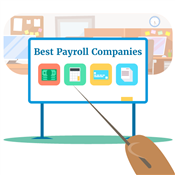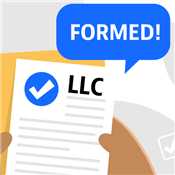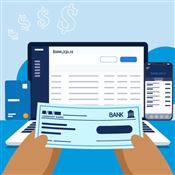How to Move Your Business Online: Beginner's Guide
Creating an online storefront is the logical next step for any business today. Find out how to make the transition online with this guide.
There's never been a better time to move your business online.
But it can be difficult to know where to start.
This resource guide is made to help local retail, service businesses, and restaurants make the move to a digital storefront. Find out how to build a website, set up payments, and make an impression online.
1. Buy Your Domain Name
 |
First and foremost: buy a website domain that matches your business name. After all, it's essential for good branding.
These web hosting providers let buy and register your domain name in just a few minutes.
Web Hosting
- Best Web Hosting Providers for Small Businesses - 2020: List of web hosting providers including pros and cons, and cost.
- HostGator Review: Full review of web hosting provider HostGator, which offers a website builder, WordPress hosting, VPS hosting, dedicated hosting, and 24/7/365 support.
- Bluehost Review: Full review of web hosting provider Bluehost, which offers shared hosting, VPS hosting, dedicated hosting, and WordPress hosting, plus SEO, pay-per-click, and website migration.
- GoDaddy: Domain registration platform and a web hosting provider.
- SiteGround: Offers web hosting, WordPress hosting, WooCommerce hosting, and cloud hosting, plus website migration, and collaboration tools.
- A2 Hosting: Web hosting, WordPress hosting, VPS hosting, reseller hosting, and dedicated hosting, plus domain registration.
- Hostinger: Web hosting, VPS hosting, WordPress hosting, email hosting, and cloud hosting, plus domain registration and a website builder.
- DreamHost: Web hosting, WordPress migration, and website builder, plus domain registration, email hosting, and website optimization.
- InMotionHosting: WordPress hosting, VPS hosting, dedicated hosting, and shared hosting, plus IT support and a website builder.
2. Build Your Website
 |
Many of the web hosts listed above also offer website building services, or you can opt for one of the website builders here.
Most website builders are user-friendly even for novices, but you can always outsource these tasks to freelancers.
Website Builders
- Best Website Builders for Small Businesses - 2020: List of web builder tools including rating and details about each tool, plus how to choose the best for your business.
- BoldGrid: Tools and plug-ins for building WordPress websites, also offers free templates.
- Weebly: Website builder with e-commerce plug-ins for creating online stores; offers marketing tools, shipping tools, inventory management, and payment options.
- Wix: Website builder with easy-to-use templates for web design; offers free hosting, mobile optimization, and plug-ins for e-commerce migration.
- WordPress: Website builder that can be used for personal blog sites, websites, and e-commerce stores. Free to start but offers paid plans with optimized tools.
- SquareSpace: Website builder with e-commerce integration capability, inventory management, merchandising, mobile optimization, and shopping cart integration.
- How to Build a Minimum Viable Product: A step-by-step guide to building an MVP for your business, whether it's an app or website landing page.
Freelance Web Designers
- Upwork: Network of freelancers/remote works for hire, with client-rated talents, tracking software, and simplified payment process.
- FlexJobs: Provides access to talent pools of remote workers, with unlimited job postings and resumes searches.
- Freelancer: Crowdsourcing platform with professionals for hire; uses bidding system, tracking software, and secure payment features.
3. Add Content, Product Info, and More
 |
Now that you have a website secured, it's time to flesh it out with all the essential information.
Retail businesses would do well to consider an e-commerce platform. Regardless of your type of business, you can always consult creative professionals to fill your website out.
If you're in retail, use an E-commerce builder
- Shopify: How It Works: Guide on popular e-commerce website builder that provides tools to start selling online. Offers quick setup, custom themes, point-of-sales, and check-out.
- Woocommerce: Customizable platform for e-commerce store built from WordPress; offers necessary plug-ins for e-commerce such as payment, shipping, and mobile optimization.
- BigCommerce: Website builder for e-commerce stores, offers IT support and tools for increasing brand awareness.
- Magento Commerce: E-commerce website builder for B2C and B2B; offers cloud hosting, page builder, business intelligence, and tools to increase sales.
- Ecwid: Free e-commerce platform that can be integrated to any website or social media; no set-up or surcharge fees.
- 7 Ways You Can Use WooCommerce to Make Money Online (2020-2021): Guide on how to use Woocommerce to start running an online business.
- 7 of the best sites for selling your products online: Websites that enable you to sell your product, includes explanation of how each platform runs and perks.
- 13 Best Platforms to Sell Your Products Online: Top B2C and B2B platforms for selling products online.
- E-Commerce Digital Strategy: Assessment quiz to determine if you are ready to sell online; plus how to create a digital strategy for an online business.
- E-commerce Resource Videos: Videos about selling cross-border, including website optimization, sales channel, digital brand, payment, and international shipping.
- E-Commerce: Steps on how to start an e-commerce storefront.
Copywriting, Graphic Design, Data Entry
- Best Sites to Hire Freelancers Online in 2020: Tips on how to choose and hire freelancers online, plus a list of crowdsourcing websites.
- 99designs: Crowdsourcing platform for graphic designers.
- Fiverr: Platform to hire services for small businesses; can also be used as a platform for selling services online.
- Hubstaff Talent: Provides free access to remote freelancer profiles with tracking software and pay flexibility.
- Amazon Mechanical Turk (MTurk): Crowdsourcing platform for cheap data entry, data verification, and other clerical business processes.
- InProFinder: Find top local freelancers for accounting, marketing, graphic design, copywriting, and website design.
- Guru: Crowdsourcing platform that helps business owners find freelancers; with payment transparency using SafePay.
4. Set Up Payments or Online Ordering
 |
It is crucial to make the payment process easy and user-friendly for online customers. Seriously - ever hear of "cart abandonment"?
Use these resources to set up seamless online payment processing for retail, service or restaurant businesses.
Digital Payment Processing for Service and Retail
- Cheap Credit Card Processing: Review of online credit card processing providers and tips on choosing the best provider for small businesses.
- Credit Card Processing Fees: What business owners should know about accepting credit cards and associated fees of sales transactions.
- Setting up online payments and getting paid: How online payment works and things to consider when setting up a payment method for online transactions.
- How to Accept Credit Card Payments Online: Guide on choosing a credit card processing company and processing fees to expect.
- Digital Initiatives: Details about digital wallets such as Paypal and Amazon Pay.
- Paypal: Popular payment platform for online stores; available for credit card processing.
- Stripe Review: Full review of digital payment processing provider Stripe, which offers online payments, in-person payments, platform payments, billing, card creation, pay-outs, and more.
- Square: Website builder for e-commerce stores; offers payment processing, point-of-sales, check-out, payroll, and marketing.
- Amazon Pay: Payment solution for e-commerce stores; easy set-up for check-out option, plus fraud detection and prevention.
- PaySimple: 24/7 payment solution for online stores; offers credit card processing, recurring billing, and eCheck.
Point-of-Sale Programs for Restaurants
- ChowNow: ChowNow helps restaurants transition their operation online through a customized mobile app, website ordering system, and marketing services.
- MenuDrive: MenuDrive offers an online ordering system and marketing tools for local restaurants.
- Toast: A platform that offers products to help manage restaurant operations online including Point of Sale, online ordering system, delivery services, and email marketing.
- Upserve: Upserve offers products related to restaurants' operations such as point of sale, operation management, inventory, offline/online ordering system, loyalty program, and payment processing.
5. Cover Operations and Logistics
 |
Ok, not as exciting, but no less important. Use the resources below to get your ducks in a row on taxes, sales management, shipping, cybersecurity, and more.
Taxation
- The Complete Sales Tax Guide for Online Sellers: How to calculate e-commerce tax and comply with state sales tax.
- US Sales Tax for E-Commerce: Guide on how to comply with e-commerce tax in the US.
- State Government Websites: List of state government websites to find information about taxation, plus quick links for business owners on business registration, and licenses.
Risk Management
- Retail Risk Management: The top 6 threats: Risks to look out for when running a business, plus how to protect your assets as a business owner.
- 10 Inevitable E-Commerce Risks You Should Watch Out For: Common risks to look out for when running an e-commerce business and tips on avoiding them.
- E-Commerce Risk Management Guide: How to manage risks when running an e-commerce website.
- Best Practices for Retail Food Stores, Restaurants, and Food Pick-Up/Delivery Services During COVID-19: A guideline provided by the FDA to help restaurant owners continue their operation during the pandemic.
Sales Management
- 7 Types of Technologies Small Businesses Use Today: Business tech solutions to help automate parts of your business.
- QuickBooks Online Review: Full review of accounting and CRM tool that tracks expenses and manages sales tax, invoices, inventory and more.
- Zoho: CRM tool that offers workflow automation, sales management, lead management, sale analytics, and cloud integration.
- Salesforce Customer 360 Platform: CRM tool that offers email, phone, chat, and social channels, plus data management.
- Best Retail Technology: Top Promotion Experts: Review of programs and software that can improve small businesses' customer service and operations.
Cybersecurity
- Cyber Security Planning Guide: Tips on protecting your business's data and your clients' information.
- 3 Cybersecurity Lessons for E-commerce Site Admins: Three lessons on how to protect e-commerce sites from phishing attacks.
- Are Security Concerns Keeping You From Diving Into SaaS?: List of cybersecurity threats to look out for; plus how to protect an e-commerce store and how to deal with a data breach.
- E-Commerce Security and Protection Plan for Your Online Store (2020): Tips on how to improve cybersecurity for an online store.
Shipping
- 8 Shipping Options to Consider for Your Store: Guide on different kinds of shipping options.
- ShipBob: Provides fulfillment network for online stores. Off inventory management, order management, and 2-day express shipping.
- The Beginner's Guide to Ecommerce Shipping and Fulfillment: Guide about e-commerce's shipping and fulfillment, including costs and tips.
- USPS: Offers business shipping services, postage options, and tools for businesses.
- UPS: Offers domestic and international shipping services, plus tools and support for business logistics.
- FedEx: Offers shipping services and pick-ups, plus e-commerce center that provides tools and services for online store's shipping options.
- DHL Express: Offers domestic and international shipping services.
6. Expand Your Business onto Other Platforms
 |
Grow your customer base by expanding your business onto third party websites. No matter what you're selling, there's a platform perfect for you.
Retail
- Amazon: Take advantage of the largest user base of any business-to-customer sales platform.
- eBay: eBay's Seller Hub offers support to small businesses just getting started.
- Etsy: Etsy sellers are provided with marketing tools to help promote and increase brand awareness.
- Bonanza: A seller-centric marketplace that focuses on a sustainable model of repeat customers.
- Facebook Marketplace: Facebook Marketplace is an easy-to-manage platform that lets you take advantage of Facebook Ads.
- 3DCart: Subscription platform that offers complete set-up of an e-commerce store, including management software, free credits on other sales channels, and inventory management tools.
Restaurants/Food
- Grubhub: Order and delivery platform that is free with no upfront fee and provides access to a powerful marketing tool for restaurant partners.
- Zomato: A platform where restaurant partners can list their business and expand operations online through the help of Zomato business products.
- UberEats: An order and delivery platform that restaurant partners can use to increase visibility online to increase sales but it requires a one-time activation fee and service fee for each order.
- Postmates: An order and delivery platform that provides restaurant partners a digital front to boost their sales through local take-outs.
- DoorDash: An order and delivery platform that helps restaurant partners reach new customers through its mobile app and website.
Services
- Booksy: Platform for hair stylists, barbers, and beauticians to sell their services and connect with clients.
- theCut: App for barbers to find clients online and appointment scheduler tool.
- Fyt Pro: Platform for fitness trainers to sell their coaching services.
- Handy Pro: Platform for professional handymen to connect with customers and sell their services.
- YourMechanic: Platform for mechanics to list their services online; offers access to clients.
- How to Sell Services Online: Frontrunner Podcast Series: Podcast about selling services online including common issues and retaining target customers.
- Zaarly: Platform to offer services to customers who need help on home projects.
- TaskRabbit: Service platform that helps customers find skilled service providers; for businesses, it requires online registration and attending an onboarding session.
7. Get the Word Out
 |
Marketing is the name of the game from here on out. These helpful resources can help you build brand recognition, grow your following, and keep everyone updated on special offers and business news.
Digital Marketing
- 14 Digital Marketing Strategies for E-Commerce: Guide on how to improve the visibility of products online, plus how to improve customer experience.
- Google Merchant Center: Tool that helps small businesses upload their store and products on Google.
- Google My Business: A free online tool that can be used to list your business profile online to increase web presence in Google.
- Google Ads: Google's Pay-Per-Click Advertising (PPC) that increases visibility in the Google search and map.
- Credit Card Processing Fees: What You Need to Know: Details that business owners should be aware of the fees for processing credit cards and tips on how to lessen the costs.
- Best Loyalty & Rewards Programs: Top Marketing Experts: Loyalty and rewards programs are effective tools for small businesses to retain customers or reach new customers.
- Marketing and sales: Guide and strategies on how to start a marketing plan for small businesses.
- Business Guide To The FTC's Mail, Internet, or Telephone Order Merchandise Rule: A guideline of rules that small businesses should follow when marketing their products.
- eCommerce Business Service Provider (BSP): An online directory of service providers of SEO, website optimization, social media, and other digital marketing services for small businesses.
- Google Webmasters: A Google tool used to optimize websites and improve web presence through SEO.
- Advertising And Marketing On The Internet: Rules Of The Road: Guideline for small businesses when marketing their product online as safeguard for both consumer and retailers.
- 3 Tactics To Drive Restaurant Online Ordering Sales: Strategies on how to increase sales and market your foodservice by utilizing an online ordering system.
- How to Do Restaurant Marketing: Guide on how to start marketing your foodservice with the purpose of increasing visibility and boosting sales.
Social Media Marketing
- 11 Social Media Marketing Strategies for Ecommerce Websites: List of social media platforms for marketing products online.
- Social Media Marketing: A 30-minute course for understanding and taking advantage of social media marketing for small business owners.
- Facebook Ads: Most popular social media advertisement tool; easy and affordable way of building web presence.
- Pinterest Ads - Promoted Pin: Pinterest paid advertisement that increases visibility of pins.
- How Much Does It Cost to Promote a Tweet: Guide on how to use promoted tweets on Twitter as a marketing tool for small businesses.
- Instagram Business: Small businesses can set-up a free business profile on Instagram and create a business account to gain access to features such as promoted posts or paid advertisements.
Bottom Line
With these resources, you have the tools you need for your successful business to make its digital debut.
Although there are many factors to consider in the process, don't feel rushed or pressured to get it up and running sooner than you're ready. Rome wasn't built in a day, and your website probably won't be either (that's okay!).
Holly Zorbas is a assistant editor at CreditDonkey, a credit card comparison and reviews website. Write to Holly Zorbas at holly.zorbas@creditdonkey.com. Follow us on Twitter and Facebook for our latest posts.
Note: This website is made possible through financial relationships with some of the products and services mentioned on this site. We may receive compensation if you shop through links in our content. You do not have to use our links, but you help support CreditDonkey if you do.
|
|
|











